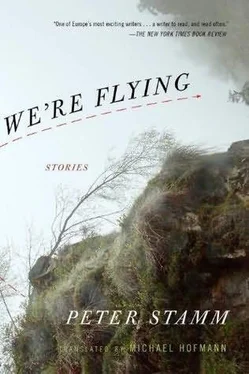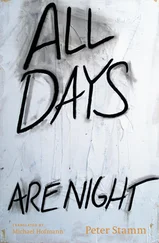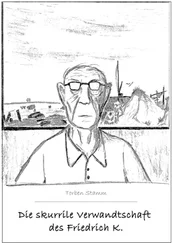Twenty years later. The radio alarm plays “I Got You, Babe.” A hand slams on the button and the music stops. A man gets up, sits for a moment on the edge of the bed, his face buried in his hands. He stands up and leaves the room. We track him to the bathroom, then to the landing. The camera pans away from him, moves toward the window, then through it. Outside a street in a poor neighborhood. The asphalt is wet, but judging by the clothes of the passersby it is not cold. As if on command, the extras start to move. A man carrying a bouquet of flowers walks past, the same as every morning, then two women of thirty or so, presumably foreigners, with long black hair. Both are wearing jeans and white T-shirts, one of them is carrying a light blue shoulder bag. They are yards apart, but even so they seem to belong together, like clones, or sisters unaware of each other’s existence. The front door of a house opens. The man we saw a moment earlier steps out onto the pavement. His hair is wild, he looks like an unmade bed. At a corner bodega he buys a cup of coffee. Then he walks on in the same direction as the two women.
From street level, a couple of steps lead down to a low basement premises. VIDEOCITY it says on the glass door. On the inside of the glass is a red sign: CLOSED. The man unlocks the door, walks in, and turns the sign around. A smell of cold cigarette smoke. The room is dark, even after the man has switched on a light. On the walls are shelves stacked with hundreds of videocassettes, at the far end of the room is a counter with a cash register and a small TV set. Behind it a door leads into a tiny room with a toilet, an old fridge with a stained coffee machine on it, and a rickety cabinet that looks as if it’s been salvaged from a dumpster. The man plugs in the TV and the register and starts the coffee machine. Only then does he take off his coat.
All morning no one comes. A little before noon, a short woman of about fifty walks into the shop and looks around. She is wearing blue shoes and a 1950s hounds-tooth jacket. She has a vaguely stunned facial expression. She seems to have walked in by mistake. She turns and walks out again without saying a thing. It often happens, people walk in here and leave, for no apparent reason. Sometimes they just look in the window, sometimes they walk in under some pretext. They’re looking for some film he’s never heard of, or they want to buy the life-sized cardboard figure in the window. Sometimes they want change for the meter. He can’t do anything, he can’t prove anything. They’re too cunning for him. Once he saw that someone must have broken in during the night. Since then he’s careful to remember all the details of where he leaves everything when he goes. They must have noticed it, because they’ve stopped coming in at night. They are very cagey.
It’s not just the young men in dark suits with name tags. Sometimes there are children or old women, foreigners with some illegible piece of paper they hold in his face, some address they claim they’re trying to find. He’s remembered the addresses, marked them down on a map, and connected them up. It’s not yet clear to him what their significance is. He is unable to trust even his oldest customers. They’re sounding him out. They start a casual conversation, ask him if he’s seen some film or other, and what he thinks of it. He’s very careful with what he says. He doesn’t know how many of them are involved. It’s not impossible that they’re all in league with each other.
The sets are made of wood and stone. They are to very high specifications, you barely notice the difference, but you sense there’s something missing. Distant buildings seen against the light look transparent. The horizon retreats as you walk toward it, it seems two-dimensional, a painting. Sometimes he spots mistakes, trivial things, but they can’t be accidental. When he taps the wall, it makes a hollow sound. Some things are smaller than they should be in reality. He feels tempted to lift the manhole cover in the street to see what’s concealed underneath. But that would be too obvious. When he goes home at night, he thinks he could just keep on going, straight on, but he’s convinced they wouldn’t allow it. He would lose his way in the streets, he would wind up at a dead end. An accident could be organized.
Every step he takes is watched. At night he can hear people walking about in the apartment above. He’s tried to spot the cameras and microphones, but they’re so small and so well concealed that he can’t find them. He can’t exclude the possibility that a computer chip has been implanted in him that records his whereabouts, controls his physical processes, pulse rate, blood pressure, metabolism. He pats himself down sometimes, but he can’t feel anything. The chip must be buried deep in his flesh. He doesn’t believe they can read his mind. The technology for that hasn’t been invented. But they’re working on it.
When he showers, he hangs a towel over the mirror. When he goes shopping, he often puts back the package he picks up first and chooses a different one from the back of the shelf. He’s noticed the salespeople looking at him. He is almost certain they are mixing things into his food, drugs that alter his consciousness. Hence his forgetfulness, his visual distortions, his racing pulse, his tendency to sweat. Hence the occasional panic attacks. Who knows whether the medications the doctor prescribes aren’t the real cause for his condition.
He’s stopped going to restaurants long ago. He’s not even sure of the coffee at the corner bodega. Sometimes he changes his order to tea at the last moment. Then he monitors his body’s reaction very carefully.
For security reasons, he’s detached the little TV from the antenna. There’s nothing easier than picking up data that travel through a wire. Now he only watches videos. They are his last connection to the world outside, to the real world. He sees the same films again and again, runs them in slow motion and attends to their tiniest details, to minute slips. A wristwatch in a film set in ancient Rome. The shadow of a boom falling across a scene.
He’s tried to get in touch with film people, written letters to Jodie Foster and Martin Scorsese. No reply of course. It was naive of him to suppose his letters would get through, but back then he saw no other way. Since then he’s learned to use dead letterboxes. He leaves his plans and protocols and samples behind mirrors in public toilets or in garbage cans at certain crossings. He gets the position of the garbage cans from films, and also whether the messages have been received. His progress can be charted from film to film. Each film answers the question put in the one before. The communications are encoded, but he’s learned to decipher them. Sometimes he laughs aloud when he gets their meaning. He often feels a great hilarity, the cool bliss of being undeceived. He won’t be misled by the voices in his head anymore: You can’t leave. This is where you belong. You belong to me .
The sudden clarity, after years of uncertainty. He walks through the city and laughs. He sees through things. He could knock over the buildings with one hand, uproot the trees that have been fixed in the ground like parasols. He has achieved mastery over his body. By pure mind he can control his physical functions.
He knows his contribution is vital. Otherwise they would have pulled him out long ago. A sacrifice will be required of him, but he is willing. The sacrifice will give shape and meaning to his life.
He has forgotten his sandwiches. He wonders whether he dares to buy a hamburger at the bodega. They can’t know that today of all days he will go there. If he’s quick enough, he can take them by surprise, not give them time to doctor his food. Some risks are unavoidable.
Читать дальше







![Brian Jacques - [Flying Dutchman 01] - Castaways of the Flying Dutchman](/books/128851/brian-jacques-flying-dutchman-01-thumb.webp)




